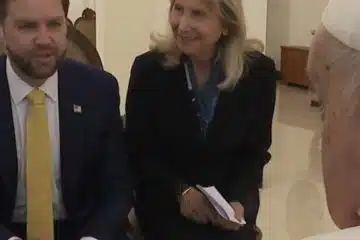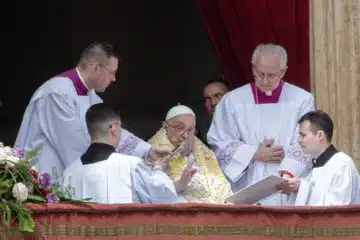Guest Column: Can we have non-violence without adequate structures?
Thursday, September 10, 2009
By Father Ben Urmston, S.J.
There are many forms of non-violence — prayer, meaningful dialogue, conflict resolution, arbitration, education, voting intelligently, giving input to our public representatives, getting basic human rights into our legal and constitutional structures, civil disobedience, arbitration and many others. But can the many forms of non-violence work without adequate structures?
On July 8 Pope Benedict XVI issued an encyclical, Love in Truth. On July 17 Walter Cronkite passed to the next life. On July 31st the Society of Jesus world-wide and their partners in more than 160 nations, Christian Life Community, celebrated the feast of St. Ignatius of Loyola. At first these three events may seem unrelated. But Benedict XVI, Walter Cronkite, and St. Ignatius point us to a major issue facing our human family, which affects all of the other issues — a democratic world federation.
Is it possible to say we’re non-violent if we don’t even discuss ending the war system? The war system is eating us alive! Look at what percentage of taxes goes to supporting military security. Federal budgets are a scandal. Look at the way the invasions of Afghanistan and Iraq have not only killed and wounded many soldiers but have affected their mental health! There are four million Iraqi refugees. More civilians have been killed and wounded than military personnel.
There are Christians who believe that to work toward a world federation before Christ comes again is the work of the devil. An Episcopalian, Cronkite responded, “If that’s true, put me at the devil’s right hand.”
Benedict XVI proceeds from theology and philosophy. Cronkite concludes the necessity of a democratic world federation from experience in, and observation of, world events. The Society of Jesus and Christian Life Community follow Jesus and Christian leaders.
Benedict XVI states that the basic form of poverty is isolation, not being able to love or not being loved, closing in on oneself, thinking one is self-sufficient or considering oneself too insignificant to belong. There is much interaction now on a worldwide basis. We need an “aha” moment when we recognize we are one human family. No one can go it alone. All of us have talents we can contribute to the common good.
We grow through our relations with others and with God. Peoples grow in relationship with other peoples. The family does not submerge the identities of its individual members. The unity of the human family does not submerge the identities of individuals, peoples and cultures. Rather, individuals and peoples can only grow together when there is security, sharing and giving of themselves to others and to the common good.
Each person of the Christian Trinity gives themselves completely to one another in a unique and absolute unity. Yet each person remains distinct in profound interpenetration.
Jesus prays that “they may be one even as we are one” (John 17:22). The human family can only be enriched by looking toward the Trinity. True openness and sharing with one another does not mean loss of individual identity but profound unity.
If a religion leads to selfishness, cutting oneself off from the neighbor or the community, we know this is a false religion. Respect for the whole person and every person is the criterion for evaluating cultures and religions.
Just as the 13 colonies in 1787 became convinced they needed to move from a confederation to a federation, Walter Cronkite knew that national sovereignty in 2009 now means something new. Even though the U.S. economy and military remain enormous, no nation can go it alone. The human family needs to respect and value the whole person and every person. We need to value all peoples and all cultures. True openness and sharing with one another does not mean loss of individual identity but profound unity.
The first U.S. president, George Washington, spoke against the spirit of parties. “By this term Washington meant the attitude that one’s own faction was more important than the whole . . . the spirit of party meant to overcome, or even destroy, rather than learn from the opposition. A reconciling force as Washington was can help us regenerate our image of the democratic process and correct our fantasies that a marketplace of egoistic impulses somehow miraculously produces intelligence and harmony. Washingtonian democracy is not the freedom to try to destroy each other, but the freedom to bring one’s own best thought together with one’s best effort to listen and attend to the other” (Jacob Needleman, The American Soul, Rediscovering the Wisdom of the Founders).
Change in the way we look at our human family and our nation states may lead us to examine and re-examine present attitudes and present structures. We can’t write without a pencil or pen. We can’t send an e-mail without a computer. We can’t make decisions as a human family without adequate structures that will work. For local decisions, we need local government. For national decisions, we need a national government. For global decisions like ending the war system, confronting global climate change, creating a fair global economy, we need a democratic world community, a global legislature, a global judicial body, a global administrative council, a global police force.
Inviting the nations of the world to agree on a world constitution with democratic structures, checks and balances, according to the principle of subsidiarity is an enormous challenge. But leaving us with present structures is like sending a baseball player to the plate without a bat.
Without a democratic world federation, a global ethic, the various forms of non-violence, a fair global economy won’t work. If we don’t begin to discuss and work toward a democratic world federation, we’re avoiding a necessary structure without which the various forms of non-violence will be in the end ineffective. I never underestimate the will and power for good of God and the human person.
Father Urmston is the director of peace and justice programs at Xavier University.












